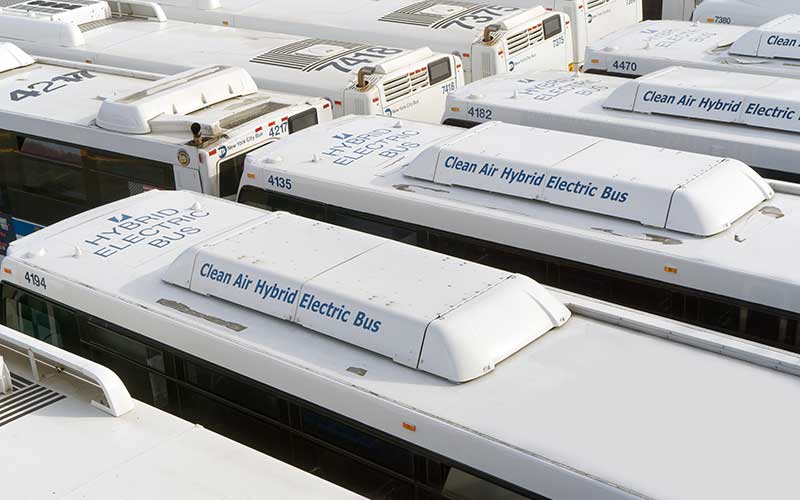
We need transportation and climate policies that cut emissions at the scale required to reach state targets. And emissions cuts must make a meaningful difference in air quality and mobility for the communities that need it most. TCI falls short on both counts. Photo: Rhonda Roth via Shutterstock
The U.S. transportation system is broken.
First, the ways we transport people and goods now contribute the lion’s share of climate-damaging emissions in the country. Second, the dangerous air pollution spewed by our cars, trucks, and buses disproportionately harms the health of Black and Brown communities and those with low-incomes. And, third, those same communities invariably have the least access to transportation options, whether public or private.
To fix these issues, we must overhaul our transportation system to both cut greenhouse gas emissions and improve our health, safety, and well-being. This transformation also must correct the deliberate and ongoing disinvestment in the communities that have borne the brunt of pollution, noise, and other transportation impacts for decades.
Transportation and Climate Initiative Should Improve Conditions for Communities that Need It Most
The multi-state Transportation and Climate Initiative (TCI), combined with other policies, can potentially reduce climate-damaging emissions while beginning to address air pollution issues and historic disinvestment. In late December, Connecticut, Massachusetts, Rhode Island, and the District of Columbia announced an agreement on how to move TCI forward.
TCI was designed through a regional process among 12 mid-Atlantic and Northeast states and the District of Columbia. The program aims to limit the amount of climate-damaging emissions released by vehicles by imposing a fee on gasoline and diesel fuel suppliers. With the proceeds from those fees, each state will then invest in clean transportation projects, including public transit, electric vehicles, bike lanes, and pedestrian safety, among others.
For CLF and many others who put significant time into the TCI process, the program presents an opportunity to address the longstanding inequities in our current transportation system. For generations, too many New England communities have been overburdened by air pollution from cars, trucks, and buses. Those same communities have been denied access to clean, reliable, and affordable transportation options by state leaders who have never dedicated – or have outright withheld – the resources necessary to fund them.
TCI Misses the Mark on Emissions Cuts, Improved Health, and Better Transportation Options
The TCI agreement falls well short of its potential. This is because the process for developing it failed to meaningfully engage the communities that suffer most from air pollution and desperately need new investments in clean transportation. The final TCI agreement includes explicit references to equity in how it is implemented and the creation of equity advisory bodies in each state. But these earnest and belated pledges do not compensate for lack of community input and a deficient final agreement.
As written, the current TCI framework will not cut emissions at the scale needed to reach the climate targets set (and, in some cases, mandated) by New England states. Nor is there certainty that those cuts will make a meaningful difference in air quality and mobility for the communities that need it most. To meet these objectives, TCI must include enforceable rules in each state to:
- require TCI revenues be invested only in clean transportation projects, not diverted to unrelated projects or used simply to fund current levels of transit service;
- dedicate more revenues to underserved communities. The current 35% allocation is not nearly enough. There also must be greater assurance that funds allocated to these communities actually reach them;
- protect low-income drivers as fuel suppliers inevitably pass all or part of TCI fees on to consumers, so that those least able to afford a cleaner vehicle (or without reliable access to clean public transit options) do not bear the brunt of higher fuel costs;
- demonstrate how TCI is improving health and mobility for those exposed to the highest air pollution and with the fewest transportation options. We need to have the tools and data to understand progress at the neighborhood level.
Now, as state leaders decide how to implement TCI, CLF is demanding these critical changes to ensure that the program serves both climate and community imperatives.
However, we also know from experience that one policy alone cannot achieve the level of transformation needed to redress the racial and economic inequities – and environmental burdens – of our transportation system. We need our state leaders to commit to a broad range of transportation and climate policies focused on reaching these critical goals.
Together, We Can Advance Broad and Equitable Transportation and Climate Policies
We must urgently cut emissions from transportation to avoid the worst impacts of the climate crisis. But, we cannot leave our most vulnerable neighborhoods behind in the process. We have a rare opportunity, right now, not just to rethink our transportation system, but to reinvent it.
TCI’s founding document falls far short of that aspiration. But the changes needed for it to reduce emissions and focus squarely on those who have borne the brunt of climate risk and transportation injustice are achievable. Indeed, those touting TCI’s benefits most ardently seem to assume, with little basis, that the protections CLF and other groups seek are already in place.
Massachusetts, Connecticut, and Rhode Island will now begin turning this paper agreement into concrete policy. CLF will be at the table in each state, pushing to make TCI live up to its full potential and advocating for the range of interrelated policies needed to transform our transportation system.
Your voice will matter, too. To get updates on when you can speak up and take action, be sure you’re signed up for CLF emails.



